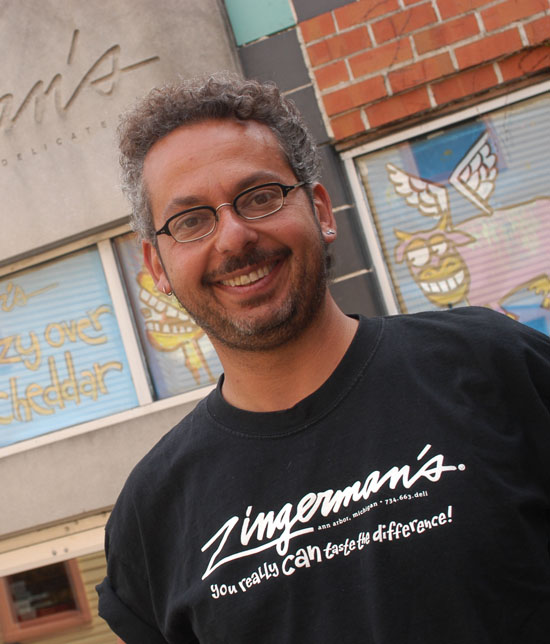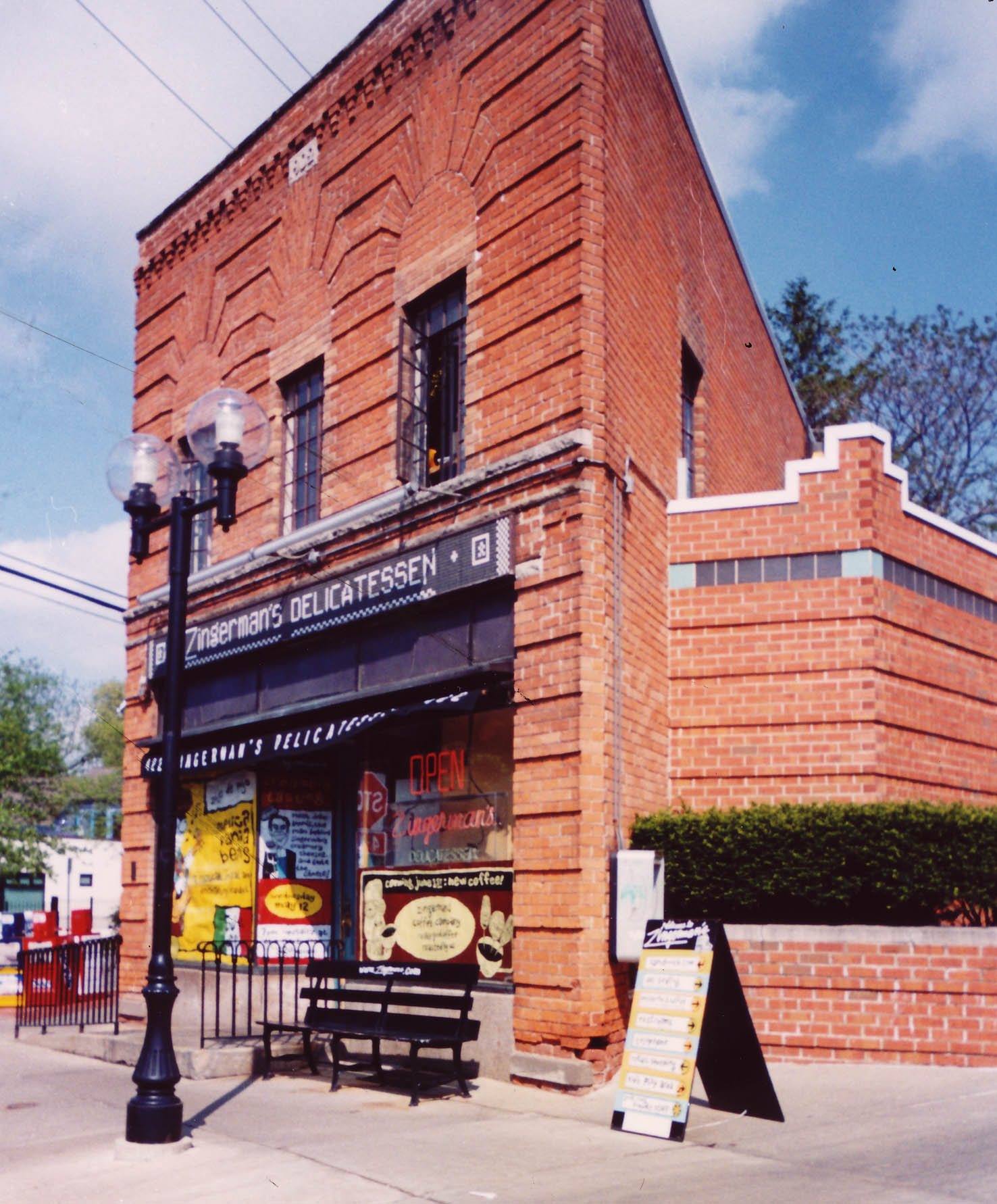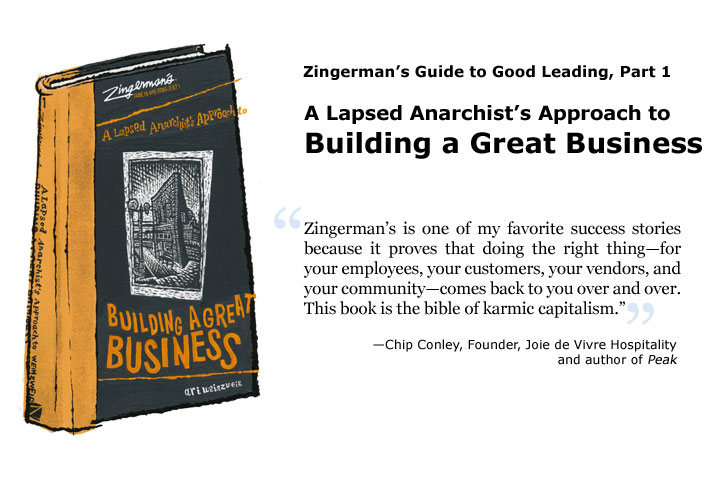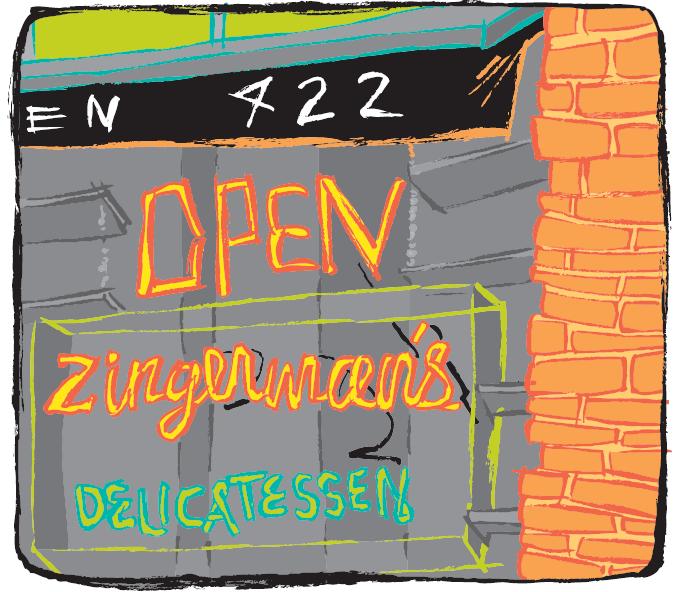
Ari Weinzweig’s latest book landed on Inc. magazine’s best books for business owners of 2010.
Maybe a little surprising when you see the title: “A Lapsed Anarchist’s Approach to Building a Great Business.” Maybe not so surprising because the lapsed anarchist has helped build a business with an impressive national profile — the New York Times called it a corner deli with international appeal and Oprah scored their brisket sandwich an 11 on a scale of 1 to 5.
Weinzweig, co-founder of the iconic Ann Arbor deli Zingerman’s, is quick to point out the difference between anarchy and anarchism. While he was a history student at University of Michigan in the 1970s, he read the teachings of anarchists who advocated respect for the individual and freedom from the restrictions of government or external authority, not bomb throwing and chaos.
That philosophy of freedom spoke to Weinzweig’s suspicion of business — until he co-founded a business with Paul Saginaw, and learned that structure and leadership can actually help people succeed, rather than just oppressing them.
“Paul taught me many years ago that business is really a tool, that you can do good things or you can do bad things. I used to think you could only do bad things.”
Thus was borne the Lapsed Anarchist series. The newly launched Zingerman’s Press is selling the first collection of Weinzweig’s musings on the philosophy behind their $35 million nationally known food mecca, and he’s working on getting the second one out in late 2011.
I have many lovely food memories around Zingerman’s — it’s the place I learned to love olives, it’s where John and I bought the goodies for a party we threw our first New Year’s Eve together. But when I sat down with Weinzweig recently, we talked more about his approach to leadership than about the full-flavored food that’s at the heart of their business.
Zingerman’s as a sustainable family farm

One of my favorite ideas in “Building a Great Business” is Weinzweig’s comparison of Zingerman’s to a small, sustainable family farm, as opposed to a corporate factory farm.
Where a factory farm is about maximizing output, ensuring consistency and cost controls to get to short-term returns, Zingerman’s aims for something more holistic and good for the ecosystem.
In their quest for full-flavored food you can’t get everywhere else, they use high-quality ingredients and labor-intensive methods that mean high production costs. They manage in an inclusive way, having 17 Zingerman’s Community of Businesses managing partners engage in the process, surely is not the fastest or most efficient way to operate. They do considerable care and feeding of the community, including founding and running the nonprofit Food Gatherers.
Weinzweig feels strongly this is not some hippie feel-good approach, but simply the most logical path to success.
“It has to benefit everyone or it doesn’t work,” he said, comparing the old way of doing business to strip mining your human resources. If employees have to unionize to get what they want, and you get locked into battle with them, who wins? he asked.
“I feel like we’re just going with nature and they’re going against nature,” he said of the corporate farms of the business world.
Bo Burlingham’s edgy, insightful 2003 Inc. magazine article calling Zingerman’s the coolest small business in America spoke to the business’s culture:
It was at (a ZingTrain) seminar that Todd Wickstrom first experienced Zingerman’s. At the time, Wickstrom owned two franchised bakeries in Chicago that he wanted to improve, and he thought the session might give him new ideas. It did. On his return to Chicago, he sent Weinzweig an E-mail message: “The seminar made me realize you can live your ideals in the food business. The bad news is, I can’t do it here.” Weinzweig invited him to become a managing partner of the deli, and Wickstrom jumped at the opportunity. He sold his bakeries and moved his family to Ann Arbor. “I would have come in as a dishwasher to be in this environment,” he says.
The environment is, indeed, ZCoB’s most striking feature, combining a strong sense of community, a deep belief in people, a fascination with management and business, and a passion for great food and great service. It’s an entrepreneurial environment in which good ideas become real businesses, and employees with good ideas have an opportunity to become owners. More to the point, it’s an environment that many can’t resist. “Working here has never felt like a job to me,” says Wickstrom. “I’m constantly learning about managing, about food, and about myself.”
Inclusive management style
Though Weinzweig’s lapsed anarchist approach does advocate for strong leadership and clearly documented structures, he is also passionate about openness and inclusion of their 500 employees. This ranges from an Open Book Finance style that teaches staffers about company financials, as well as including staff in setting company vision and copping to making mistakes as the boss.
“In the moment, it’s not always easy,” Weinzweig concedes about this openness with employees. “It can be awkward and uncomfortable.”
But while there’s short-term benefit to just telling people what to do, the long-term payoff of helping employees understand their part in an overall strategy is that they do a better job. They can see where they’re headed and adjust course if necessary. They care because they see why it matters.
Weinzweig tells the story in “Building a Great Business” of hurrying to the deli in the Northeast blackout of 2003. He found the staff so in control of a situation they never could have anticipated or trained for that he left for a run.
Zingerman’s Press

Restaurants are legendary for the grueling demands they place on owners, but Weinzweig is disciplined about making time for various activities he values, from working the floor at Zingerman’s Roadhouse filling water glasses to running to writing.
Zingerman’s Press, a small self-publishing business, is selling Weinzweig’s book Zingerman’s Guide to Better Bacon, in addition to Building a Great Business — first in a series on the Zingerman’s business philosophy.
Weinzweig said much as ZingTrain, their $700,000 year training business, has helped them hone and refine their approach to employee training, writing has sharpened his business approach.
“For me, it’s hugely helpful because it helps me get clear on what I’m thinking,” he said. Plus, coming from a family of academics, it lets him research new ideas and teach those ideas both internally and externally.
He’s hard at work on the next volume: “Zingerman’s Guide to Good Leading, Part 2: A Lapsed Anarchist’s Approach to Being a Good Leader.”
[youtube=http://www.youtube.com/watch?v=kZALwn_MM1c]
2020 vision
 Weinzweig, true to his anarchist roots, is openly skeptical of business buzz words. He writes, “Twenty years ago or so I was pretty solidly certain that mission statements were little more than a serious waste of time and one more dumb ‘flavor of the day’ thing for businesses to do instead of taking care of their real work.”
Weinzweig, true to his anarchist roots, is openly skeptical of business buzz words. He writes, “Twenty years ago or so I was pretty solidly certain that mission statements were little more than a serious waste of time and one more dumb ‘flavor of the day’ thing for businesses to do instead of taking care of their real work.”
Today he’s been won over to the value of crafting clear, compelling mission, vision and planning documents — all of them serving different purposes. From ZingTrain’s description of Zingerman’s Annual Planning:
Planning—and even more importantly following the plan—has become such a normal part of what we do that I can’t imagine trying to guide an organization without it. Yet based on conversations with hundreds of specialty food managers and owners, my guess is that many businesses do not create an annual plan.
Basically, the plan is how we map out the future we want to strive for in the coming year. We begin planning activities, not with the present-day reality, but with a vision of a better tomorrow. This process is sometimes referred to as “positive futuring, or “beginning with the end in mind.
The mission statement should answer four questions:
- What do we do?
- Why do we do it?
- Who are we that are doing it?
- Who are we doing it for?
A vision is something related but different. It’s a clear, compelling view of what the organization will look like some distance in the future.
Some 20 years ago, Paul asked Ari what his vision for their business was 10 or 15 years down the road. That question prompted them to spend a year or two writing “Zingerman’s 2009,” which declares their commitment to high-quality food and to creating career opportunities through growth, among other principles. An MSN article described it as the way Zingerman’s overcame its midlife crisis.
What do you do when your company has reached the point of a “midlife crisis”? Sales are flat. Profitability is dipping. Growth is limited. Employees seem to just punch in and punch out. Arguments persist within the leadership team. And you’re paralyzed by risk avoidance. This is exactly what happened to Ann Arbor, Michigan-based Zingerman’s Delicatessen in the early 1990s.
“At some point in the life cycle of a business,” said Zingerman’s co-founder Paul Saginaw, “you come to the realization that fundamental change is needed. The first order of business is coming up with a vision of where you’re going to go.”
A vision helps them get clarity both to where you’re going and where you aren’t going.
Their new and improved 2020 vision, for example, calls for growing the Zingerman’s Community of Businesses to include 12-18 unique businesses, all in Ann Arbor. “We are strongly rooted in the local terroir,” it states, affirming Zingerman’s decision not to expand or franchise outside of the community.
From an Open Forum article by Ed Levine:
You might expect someone with a proven business model like Weinzweig’s to take it elsewhere, expanding across the country or the world. But Zingerman’s, for him, is synonymous with Ann Arbor. “We chose to create what we call the Zingerman’s Community of Businesses”—a collection of Zingerman’s businesses, each with its own food specialty, all in Ann Arbor. “We like the community, we don’t like replication,” Weinzweig says. “Businesses lose their soul and become uninteresting.”
Also in the vision are commitments to radically better food and service, sharing the growth and financial opportunity across the organization and having “improved our fun factor by at least 380 percent since 2007.”
“Who wants to do anything if it’s not fun?” Weinzweig said matter of factly. “Fun is not an accident. It’s an intentional choice,” he said, but quickly distinguishing between a workplace with positive energy versus forced silly games, a la Hawaiian shirt day in Office Space. Weinzweig told NPR:
Mr. WEINZWEIG: Fun is in our guiding principles and it’s in the 2020 Vision. Life is short, and even when times are hard, which they have been and I’m sure will be again, you know, it’s important to enjoy the people and the food and the customers and everything that we get to be around them. I mean, I feel very fortunate to be around such a great group of people and to work with such great products.
Because Weinzweig and Saginaw both enjoy what they’re doing, the vision doesn’t call for them phasing out of the business after three decades at the helm. Weinzweig said neither wants to retire. They plan to die in office, he said.
“We’ve spent 30 years making a place we want to go to work,” he said. “There’s nothing we can’t do now.”
Blogging disclosure: I am rarely unbiased about anything I write about. Think of Newvine Growing as my version of Oprah’s favorite things. In the case of Zingerman’s, we love the place and have been long-time customers. I bought my own copy of Ari’s book to review, though he did treat me to a tea during our interview.


10 Comments
Keith
That was a great article and interview. I really like Zingerman’s business model, and fun they put into the business. I’ll be checking out their book and training closely.
My only criticism is the audio on the interview is too low, but turning it up makes the transition sound bites way too loud. You might want to equalize this by editing the volume of the transitions sounds to about the same volume as the interview.
Colleen Newvine Tebeau
Thanks, Keith. The book is a great read.
I’m not sure I was clear in the post that the video isn’t mine — I’ve linked to it so you can hear Paul and Ari discussing their business in their own words, but I just did my interview old school, with pen and paper.
Sheri Bell-Rehwoldt
Love Ari! Love Zingerman’s!
sonoma chicken coop
Good day! I could have sworn I’ve been to this web site before but after browsing
through many of the articles I realized it’s new to me.
Anyways, I’m definitely pleased I discovered it and I’ll be book-marking it and
checking back often!
jordi comas
Have you done any follow up on Zingerman’s? Progress on the 2020 vision? I wonder about employees that come but don’t fit well. How do you deal with that?
Leave a reply